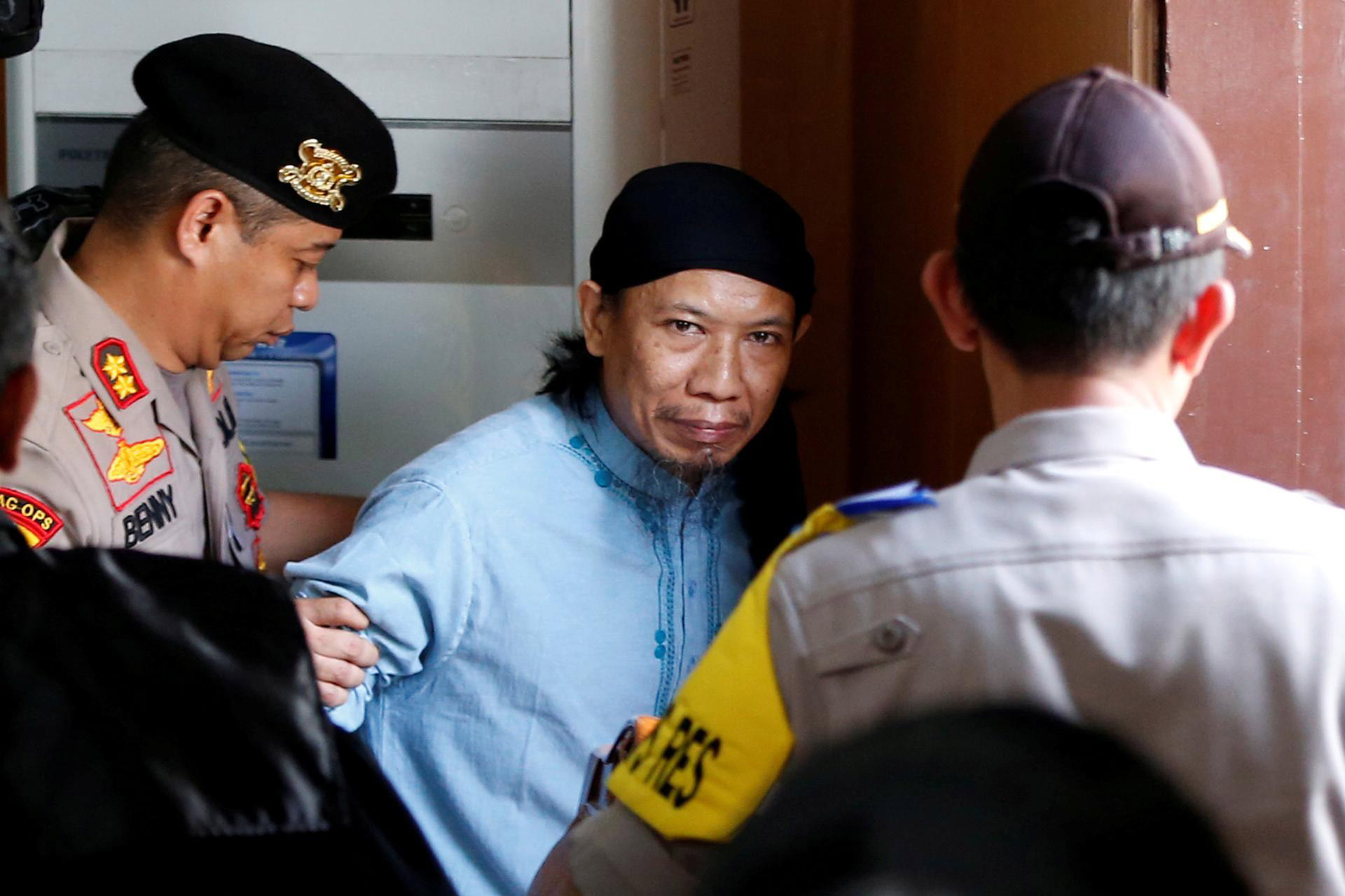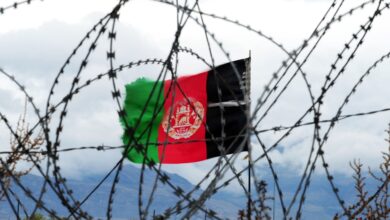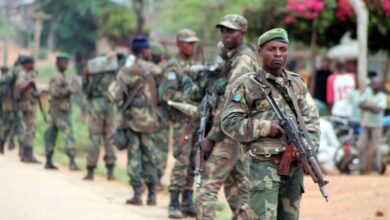Indonesia court sentences ISIS-linked cleric Abdurrahman to death for inciting terrorist attacks
Aman Abdurrahman was sentenced to death for inciting his sympathizers to carry out a series of deadly attacks including the Jakarta bombing in 2016
JAKARTA, Indonesia – An Indonesian court handed down the death penalty to a cleric linked to Islamic State for mobilizing his sympathizers to carry out a series of deadly attacks including a January 2016 gun-and-bomb attack at a Jakarta Starbucks cafe.
“The defendant Aman Abdurrahman was proven legally and convincingly guilty of committing a crime of terrorism,” said the presiding judge, Ahmad Zaini, at the South Jakarta District Court on Friday, June 22.
“The court sentences the defendant to death,” he said.
Executions in Indonesia are carried out by firing squad.
Zaini said Abdurrahman was found guilty beyond reasonable doubt of inciting his sympathizers to carry out at least five terror acts during 2016-2017, including a bombing at the Oikumene Church in Samarinda that killed a toddler, as well as a suicide bombing on Thamrin Street in Indonesia’s capital Jakarta that killed eight people including the four attackers.
Wearing a headband and sandals, Abdurrahman looked relaxed following the verdict reading. From time to time, he stroked his chin and scratched his legs.
Shortly after the five-judge panel handed down the sentence, Abdurrahman rose from his seat, then kneeled and kissed the floor to give “praise be to God.” When asked by the judge about the sentence against him, he was silent.
But Abdurrahman’s lawyer, Asludin Hatjani, said his team would consider their next move. The judge gave the lawyers seven days to consider lodging an appeal.
Hatjani said the judge imposed the sentence without considering the facts at the hearing. He said Abdurrahman’s reaction to the death sentence is neither to reject nor accept it, because he does not recognize the legal system in Indonesia.
“Because he does not recognize the existence of the judiciary and the state, he is disengaged, not accepting and not rejecting [the verdict]. He has no intention of appealing, but we as lawyers declare will think [about the next steps],” Hatjani said.
He said Abdurrahman’s actions in front of the court after the verdict reading was “a prostration of gratitude,” which in the Islamic tradition should be done when a person gets great favor. “Before the trial he stated that ‘If I am sentenced to death, I will prostrate gratitude’ and that he did.”
Abdurrahman and jihad teachings
Abdurrahman’s involvement in terrorism began in 2004 when he began to teach people in Bogor, West Java, to make bombs. He was arrested, tried, and sentenced to seven years in prison, but freed in 2007.
In 2010, he was again arrested, this time on charges of financing terrorist training in Aceh, and was sentenced to nine years in prison. He was due to be released in 2017, but the police again arrested him for alleged involvement in a series of acts of terrorism.
He is thought to have been in communication with leaders of the jihadist group, and is the main translator for ISIS propaganda in Indonesia, AFP reported.
Abdurrahman was born in Sumedang, West Java in 1972. He graduated from the Islamic and Arabic Sciences Institute (LIPIA) and became a teacher, working in a number of boarding schools in West Java before becoming an ideological leader for followers of Islamic State in Indonesia.
According to the indictment, Abdurrahman expressed loyalty to ISIS as soon as the organization was formed in Syria in 2014 under the leadership of Abu Bakr al-Baghdadi.
While in prison, he initiated the formation of Jamaah Anshar Daulah, which is an umbrella organization for ISIS supporters in Indonesia. He played a more ideological role, and his teachings were considered authoritative by his sympathizers. His teachings were disseminated through face-to-face meetings, books, websites and audio recordings.
JAD, also transliterated as Jemaah Ansharut Daulah, is an umbrella organization designated as a terrorist group by the U.S. Department of State. According to the January 2017 designation, it was formed in 2015 and comprises “almost two dozen Indonesian extremist groups that pledged allegiance to ISIL leader Abu Bakr al-Baghdadi.”
However, the Institute for Policy Analysis of Conflict said in a 2016 report that JAD, which translates as “Partisans of the State Group,” is “in fact a generic term used for any supporter of ISIS,” and functions more as an umbrella organisation than a coherent group.
The prosecutor said that according to a psychological examination, Abdurrahman was a very calm person, confident in his thoughts and words because he believed God had chosen him to fight for Islam, and supported ISIS based on Islamic law. He considered the democratic state of Indonesia as taghut (idolatrous) and its laws not worth obeying.
Abdurrahman, dubbed the “lion of tawhid” by his supporters, specializes in the study of tawhid (unity of God) and jihad (fighting in the way of God). One of the main topics he focused on was Indonesia’s “infidel democracy,” including prohibitions on participating in elections and obeying the state law over Islamic law.
Using the pen name Abu Sulaiman, his influence in the jihadist group strengthened after he translated a number of works belonging to Abu Muhammad al-Maqdisi, the mentor of former al-Qaeda leader Abu Musab al-Zarqawi.
In December 2015, Abdurrahman appealed to his followers to join ISIS in Syria, or fight in their respective countries if they were unable to travel. Otherwise, he said, they could provide financial support “to those who are willing to do so” or “urge others to undertake jihad.”
In a defense statement he read to the court on May 25, Abdurrahman denied the prosecution’s allegations. He said he was not involved in a series of acts of terror in during 2016-2017 because he was being isolated in the maximum security prison on Nusakambangan island.
“During the isolation, I did not know the news at all and could not meet or communicate with anyone other than the warden,” he said.
Abdurrahman admitted that he regarded the Indonesian government as a kafir (infidel), but said he never called for his followers to attack the police.
“Even though I am calling to the Indonesian government and its apparatus as infidel, but until this moment, I – in the recording of disseminated literature or writing, have not yet cast an appeal or call to our brothers living in this society to begin attacking the security forces,” he said.
Abdurrahman accused the government of entrapping him to imprison him for life, and his lawyer argued that the cleric had no prior knowledge of the attacks. Abdurrahman said he was not afraid of a life sentence, or even the death penalty.
“No matter what the judge’s verdict is, I have to face it coldly, so please you commit to convict me life imprisonment, or death penalty. There is no trace and no sense fear against your tyranny,” Abdurrahman concluded.
Network of militant groups in Indonesia
In a seminar in Jakarta at the end of May, Sidney Jones, a terrorism expert from the Institute for Policy Analysis of Conflict, said ISIS supporters in Indonesia are not collected under the same organizational structure, but are separated in several factions, with JAD as the largest.
The split is seen in several terror attacks that occurred during May. Two families who were members of JAD carried out suicide bombings in three churches and a police headquarters in Surabaya, East Java on May 13-14. This was followed by a terror attack by a group of militants at Riau Police Headquarters, which killed five people, including the four attackers. Police said they were members of the Islamic State of Indonesia (NII) who are loyal to ISIS.
In addition to JAD and NII, other ISIS support groups are Khatibul Iman, Al-Hawariyun and Mujahidin of East Indonesia (MIT).
“It may be that JAD is strongest in East Java but I think we should see that there are other organizations – which have nothing to do with JAD – which is still pro-IS and can move on behalf of IS,” Jones said.
According to Jones, the number of factions makes police work much more difficult because the militants are sheltering in autonomous groups and do not have a clear command structure. This is clearly very different from the terrorist group Jamaah Islamiyah, affiliated with al-Qaeda, which in early 2000 had a clear command structure.
A shortcut to heaven: How women and children became suicide bombers in Indonesia












